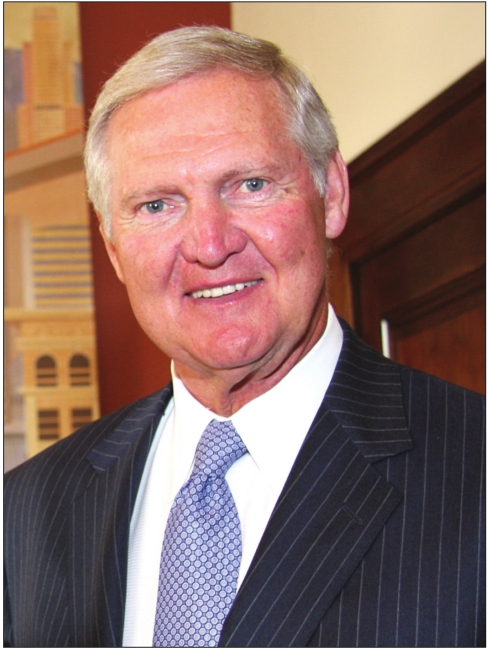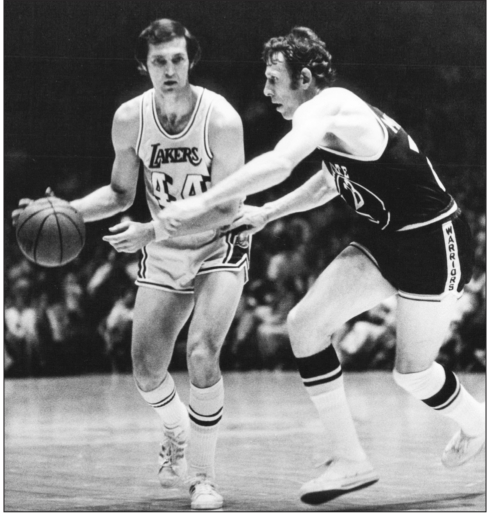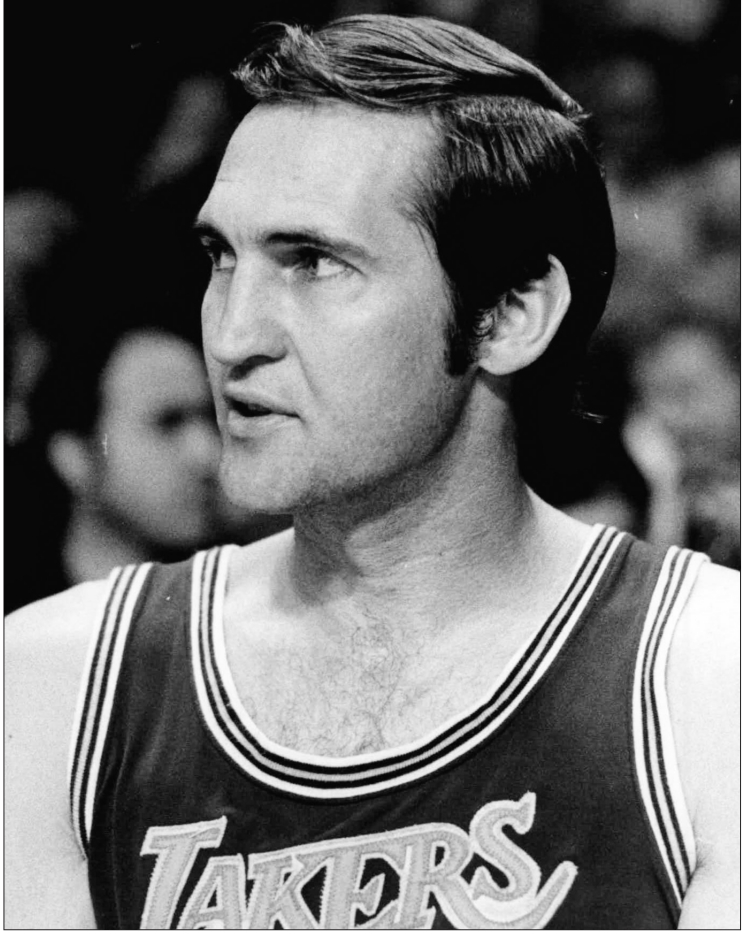
Jerry West in 2010
Jerry West being guarded by Jeff Mullins in 1971

Jerry West during his playing days with the Lakers
The game of basketball has lost another legend with the passing of Jerry West, the Hall of Fame guard from the Los Angeles Lakers of the 1960s and ’70s.
The man nicknamed “Zeke from Cabin Creek” was a star player from his high school and college days in the coal country of West Virginia until he took off with his famous number 44 Lakers jersey in 1974.
Let’s first address the “Zeke from Cabin Creek” thing. West was from Ceylon, West Virginia. The nearest post office was in Cabin Creek. And Zeke from Ceylon didn’t have the poetic symmetry of “Zeke from Cabin Creek.” Thus, the nickname was born.
West gained All-American status and the undying love of the people from his state when he decided to attend West Virginia. He averaged over 25 points a game during his three varsity seasons in a Mountaineer uniform, culminating with a national championship game loss to the University of California, 71-70.
West scored 28 points and had 11 rebounds for the team.
He was selected for the 1960 USA Basketball Men’s Olympic Team with Hall of Famer Oscar Robertson to bring home a gold medal.
West entered the NBA, joining Hall of Famer Elgin Baylor on the Minneapolis/Los Angeles Lakers. The two stars meshed immediately, forming one of the greatest scoring duos in league history. Both men averaged 27 points a game to lead their Lakers teams to dominance in the Western Conference, winning eight titles. But there was one obstacle that this marvelous team could not overcome — Bill Russell and the Boston Celtics.
West and his team came close a couple of times during the Celtics’ dynastic run of eight straight NBA titles from 1959-1966, but Russell’s team always had enough to hold them off.
The Celtics’ respect for Jerry West and Baylor was always of the highest level.
Over the years, West would hit so many game-winning shots that he would gain another nickname — “Mr. Clutch.” K.C.
Jones and Sam Jones had the thankless task of trying to contain him in his heyday. K.C., considered one of the best defensive guards in league history, told me many times during our conversations over many years, “West was one of the hardest men I ever had to cover.” When I asked him to elaborate, K.C. talked about West’s quickness of foot and the quickness of his shot release as keys to his offensive brilliance.
“You think you are close enough to at least affect his shot, but he would still get it off and put it in the basket,” Jones said.
Bill Russell and John Havlicek also had assignments to help on West.
“People don’t realize how good a driver and finisher at the rim Jerry was. I witnessed his work up close and can tell you he was a fearless competitor,” Russell said.
John Havlicek echoed the same sentiments when discussing West’s toughness.
“The guy suffered multiple broken noses and would keep coming at you. I admired his ability to play through intense pain,” he said.
West had one of the alltime best NBA Finals performances when he averaged 40 points against the Celtics in 1969, Russell and Sam Jones’ final seasons. The Celtics would escape with a 108-106 victory in game seven, but not without a scare from West, who brought his team back from a 20-point deficit, only to see them lose on a Don Nelson shot that came off a broken play. West’s performance was so dominant that he was named NBA Finals Most Valuable Player — the only player in NBA history to win the award on a losing team. Russell, playing in his last NBA game, went to the Lakers’ locker room and thanked West for being the ultimate competitor. West never beat the Celtics as a player but won their ultimate respect.
He would finally get his NBA Championship when the 1971-72 Lakers beat the New York Knicks in five games, putting a glorious finish on a season that produced a 33-game winning streak — a record that stands to this day.
Following his retirement, West moved into the front office and was the architect of the Lakers “Showtime” dynasty that produced five NBA titles during the Kareem Abdul Jabbar/Magic Johnson years. He would add to his legacy by putting together the Shaquille O’Neal/Kobe Bryant combo, which produced three more NBA titles. He produced two more while working with the Stephen Curry-led Golden State Warriors.
Jerry West is now gone from this life, but his legacy will live on. His number, 44, hangs from the rafters of the Lakers’ arena. A statue of him stands outside of that arena. The NBA logo is his silhouette. All of that is not bad for a soft-spoken guy from West Virginia.
Farewell, Zeke from Cabin Creek.